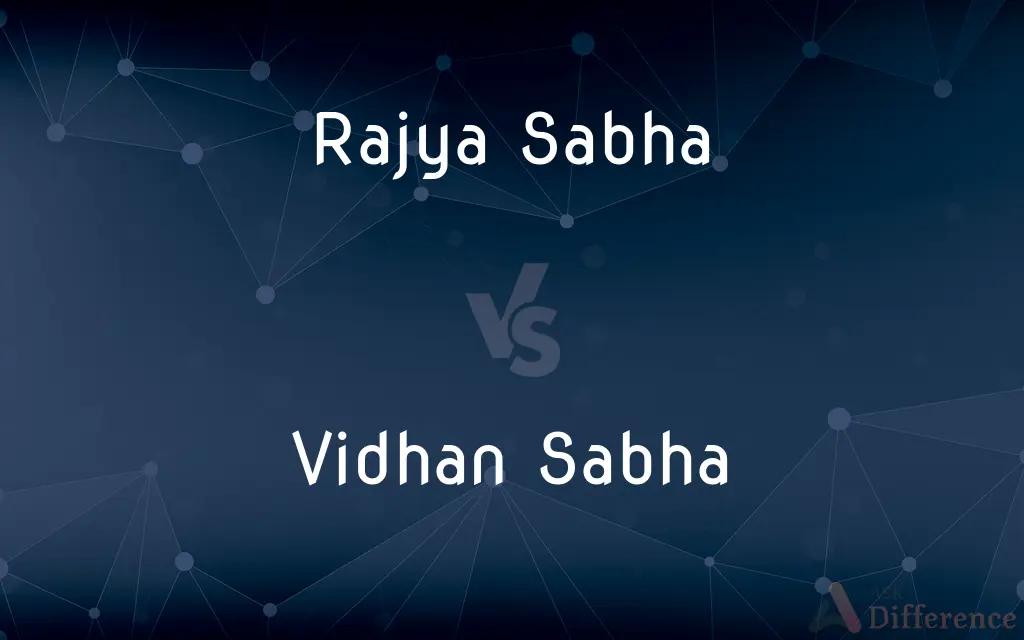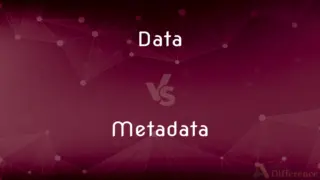Rajya Sabha vs. Vidhan Sabha — What's the Difference?
By Tayyaba Rehman & Urooj Arif — Published on February 1, 2024
Rajya Sabha is the upper house of India's Parliament, representing states at the national level. Vidhan Sabha is the legislative assembly of a state, dealing with state-level legislation.

Difference Between Rajya Sabha and Vidhan Sabha
Table of Contents
ADVERTISEMENT
Key Differences
The Rajya Sabha is a permanent body and represents the states of India in the national legislature. It is known as the Council of States, reflecting its role in representing the interests of individual states at the national level. Vidhan Sabha, or Legislative Assembly, functions at the state level and is the principal law-making body of each Indian state.
Members of the Rajya Sabha are elected by the elected members of State Legislative Assemblies, through proportional representation. This indirect election process ensures that the Rajya Sabha represents the collective decision of state governments. In contrast, Vidhan Sabha members are directly elected by the people of the state, reflecting the democratic choice of state residents.
The Rajya Sabha has a limited role in matters related to finance and money bills, where it can only discuss and suggest amendments but cannot reject or amend them definitively. This underscores its role as a reviewing body rather than a decisive one in financial legislation. On the other hand, Vidhan Sabha has significant power over state budgets and finance bills, reflecting its primary role in shaping state-level fiscal policies.
The tenure of a member in the Rajya Sabha is six years, with one-third of its members retiring every two years. This staggering of terms ensures the Rajya Sabha's continuity and stability. In contrast, Vidhan Sabha members have a tenure of five years, unless dissolved earlier, aligning with the general cycle of state elections.
The Rajya Sabha plays a crucial role in the federal structure of India, acting as a forum for discussing and scrutinizing national policies from the states' perspectives. In comparison, the Vidhan Sabha is the cornerstone of state governance, dealing with issues specific to the state and making decisions on local matters.
ADVERTISEMENT
Comparison Chart
Level of Governance
National, representing states.
State level.
Election Process
Indirectly elected by state legislative assemblies.
Directly elected by the people of the state.
Role in Finance Bills
Can discuss and suggest amendments but cannot reject.
Has the power to reject and amend finance bills.
Tenure
6-year term, with one-third members retiring every two years.
5-year term, unless dissolved earlier.
Primary Function
Reviewing and representing state interests in national policies.
Making laws and governing at the state level.
Compare with Definitions
Rajya Sabha
The upper house of India's Parliament, representing states.
The Rajya Sabha plays a key role in revising and scrutinizing national legislation.
Vidhan Sabha
Has significant power over state budgets.
The budget for Uttar Pradesh was approved by its Vidhan Sabha.
Rajya Sabha
Has limited powers in financial matters compared to Lok Sabha.
The Rajya Sabha can suggest amendments to a finance bill but cannot pass it.
Vidhan Sabha
The legislative assembly of an Indian state.
The Vidhan Sabha in Karnataka passed a new state education bill.
Rajya Sabha
Members elected by state legislative assemblies.
Rajya Sabha members are chosen by the elected members of the Vidhan Sabhas.
Vidhan Sabha
Members are directly elected by the state's voters.
Vidhan Sabha elections are held every five years in each state.
Rajya Sabha
Acts as a reviewing chamber for national legislation.
Bills passed by Lok Sabha are often sent to Rajya Sabha for further scrutiny.
Vidhan Sabha
Principal law-making body at the state level.
The Maharashtra Vidhan Sabha debates and passes laws affecting the state.
Rajya Sabha
A permanent body with staggered member tenures.
In the Rajya Sabha, members are elected for six years, ensuring continuity.
Vidhan Sabha
Can be dissolved before the completion of its term.
The Governor dissolved the Bihar Vidhan Sabha following political instability.
Common Curiosities
What is Vidhan Sabha?
Vidhan Sabha is the legislative assembly of an Indian state, responsible for state-level legislation.
Who elects Vidhan Sabha members?
Vidhan Sabha members are directly elected by the people of the state.
What is Rajya Sabha?
Rajya Sabha is the upper house of India's Parliament, representing states at the national level.
How are Rajya Sabha members elected?
Members of the Rajya Sabha are elected by state legislative assemblies through proportional representation.
Can Rajya Sabha reject a finance bill?
No, Rajya Sabha can suggest amendments to a finance bill but cannot reject it.
Does Rajya Sabha have equal powers to Lok Sabha?
Rajya Sabha has certain limitations compared to Lok Sabha, especially in financial matters.
What is the term of a Rajya Sabha member?
A Rajya Sabha member serves a term of six years.
Can Vidhan Sabha amend finance bills?
Yes, Vidhan Sabha has the power to amend or reject finance bills.
What is the role of Rajya Sabha in federal structure?
Rajya Sabha represents state interests in national legislation and policy-making.
What is the term of a Vidhan Sabha member?
A Vidhan Sabha member's term is five years, unless the assembly is dissolved earlier.
How does Vidhan Sabha impact state governance?
Vidhan Sabha plays a crucial role in shaping state policies, budgets, and legislation.
Are Rajya Sabha members permanently appointed?
No, Rajya Sabha members have a fixed term of six years, with staggered retirements.
Is Vidhan Sabha a permanent body?
No, Vidhan Sabha can be dissolved, and elections are held every five years or earlier.
Can a bill become law without Rajya Sabha's approval?
Certain bills, especially money bills, can become law with Lok Sabha's approval, though Rajya Sabha's input is generally sought.
What is the primary function of Vidhan Sabha?
The primary function of Vidhan Sabha is to make laws and govern at the state level.
Share Your Discovery

Previous Comparison
Data vs. Metadata
Next Comparison
Static Website vs. Dynamic WebsiteAuthor Spotlight
Written by
Tayyaba RehmanTayyaba Rehman is a distinguished writer, currently serving as a primary contributor to askdifference.com. As a researcher in semantics and etymology, Tayyaba's passion for the complexity of languages and their distinctions has found a perfect home on the platform. Tayyaba delves into the intricacies of language, distinguishing between commonly confused words and phrases, thereby providing clarity for readers worldwide.
Co-written by
Urooj ArifUrooj is a skilled content writer at Ask Difference, known for her exceptional ability to simplify complex topics into engaging and informative content. With a passion for research and a flair for clear, concise writing, she consistently delivers articles that resonate with our diverse audience.
















































